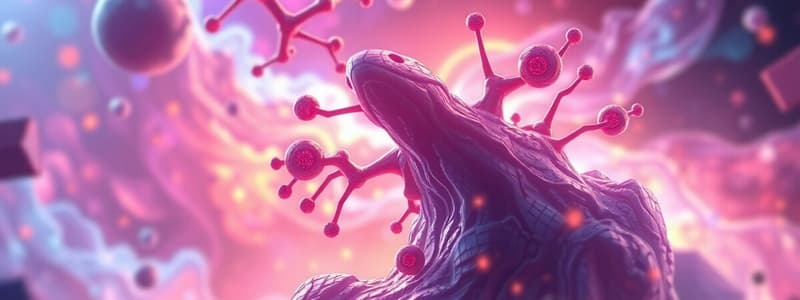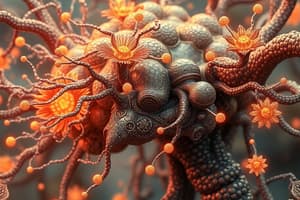Podcast
Questions and Answers
Which of the following best describes pharmacokinetics?
Which of the following best describes pharmacokinetics?
- The interaction between different drugs within the body
- The regulation of drug markets
- The study of drug effects on living systems
- The process of drug absorption, distribution, metabolism, and excretion (correct)
What aspect of drug development is emphasized as important in the module?
What aspect of drug development is emphasized as important in the module?
- Understanding drug toxicity and regulation (correct)
- Advertising strategies for pharmaceuticals
- The aesthetic packaging of drugs
- The cost effectiveness of drug manufacturing
Which component of pharmacology involves studying how drugs target specific actions?
Which component of pharmacology involves studying how drugs target specific actions?
- Pharmaceutical chemistry
- Pharmacoepidemiology
- Pharmacokinetics
- Pharmacodynamics (correct)
What is pharmacodynamics primarily concerned with?
What is pharmacodynamics primarily concerned with?
What is the focus of pharmacogenomics?
What is the focus of pharmacogenomics?
What is meant by ADME in the context of pharmacology?
What is meant by ADME in the context of pharmacology?
What role does pharmacogenetics play in drug therapy?
What role does pharmacogenetics play in drug therapy?
Why is it important to understand toxicology and contraindications in drug therapy?
Why is it important to understand toxicology and contraindications in drug therapy?
What aspect of anti-diabetic drug research is particularly focused on advancements in biotechnology?
What aspect of anti-diabetic drug research is particularly focused on advancements in biotechnology?
What are the four main processes involved in pharmacokinetics?
What are the four main processes involved in pharmacokinetics?
How does the study of pharmacodynamics differ from pharmacokinetics?
How does the study of pharmacodynamics differ from pharmacokinetics?
What role do drug targets play in pharmacology?
What role do drug targets play in pharmacology?
Flashcards
Pharmacokinetics
Pharmacokinetics
The study of how drugs are absorbed, distributed, metabolized, and excreted.
Pharmacodynamics
Pharmacodynamics
How drugs interact with their targets and produce their effects.
Drug Toxicity
Drug Toxicity
Harmful effects of drugs
Pharmacology
Pharmacology
Signup and view all the flashcards
ADME
ADME
Signup and view all the flashcards
Toxicology
Toxicology
Signup and view all the flashcards
Biotechnology
Biotechnology
Signup and view all the flashcards
What is pharmacogenetics?
What is pharmacogenetics?
Signup and view all the flashcards
What is pharmacogenomics?
What is pharmacogenomics?
Signup and view all the flashcards
What is pharmacoepidemiology?
What is pharmacoepidemiology?
Signup and view all the flashcards
What is pharmacoeconomics?
What is pharmacoeconomics?
Signup and view all the flashcards
What is biotechnology?
What is biotechnology?
Signup and view all the flashcards
What are receptors
What are receptors
Signup and view all the flashcards
What is occupancy theory
What is occupancy theory
Signup and view all the flashcards
What are agonists
What are agonists
Signup and view all the flashcards
Affinity and Efficacy
Affinity and Efficacy
Signup and view all the flashcards
What is Ec50
What is Ec50
Signup and view all the flashcards
Types of Antagonists
Types of Antagonists
Signup and view all the flashcards
Selectivity and specificity
Selectivity and specificity
Signup and view all the flashcards
4 types of receptors
4 types of receptors
Signup and view all the flashcards
Study Notes
Introduction to Applied Pharmacology
- The module aims to familiarize students with core pharmacology, including how drugs act, where they act, how they reach the site of action, how drug actions are terminated, and how such knowledge can be applied to drug selectivity.
- The module facilitates critical reflection and evaluation of evidence-based practice, enhancing students' research-informed practice and higher skills.
Module Learning Outcomes
- Students will demonstrate in-depth knowledge and understanding of applied pharmacology, including pharmacokinetics (absorption, distribution, metabolism, excretion of drugs), pharmacodynamics (drug targets/actions, drug toxicity), and drug development/regulation.
- Students will provide detailed descriptions of established and emerging topics in systems pharmacology and chemotherapy, including drug mechanisms of action and their application to treating, managing, and combating disease.
- Students will conduct and record systematic literature searches using various databases, applying and integrating pharmacological knowledge from diverse sources.
- Students will critically discuss evidence-based practice in the sciences, engaging in independent learning and evaluating scientific literature critically.
Assessment
- 70% Exam
- 30% Coursework
- 20%: Evidence-Based Practice (EBP) Case Study
- 10%: Two class tests (multiple-choice questions, short answer questions, and calculations)
Exam Paper Format
- Section A (40%):
- 20 multiple-choice questions (10%)
- 10 short answer questions (20%)
- 2 calculations (10%)
- Section B (30%):
- Choose 1 essay-type question from the systems pharmacology section of the module (e.g., Respiratory, Cardiovascular, Musculoskeletal, Endocrine, Nervous systems, Antibiotic Chemotherapy, Cancer Chemotherapy).
- Section C (30%):
- "Making reference to the published literature, provide an in-depth discussion of the pharmacological properties and mechanisms of action of an anti-diabetic drug you have investigated. Your answer must include recent research advances and future perspectives."
Seen Question Details
- Discovery, structure, class and associated physiochemical properties: (approx. 200 words)
- Principal mechanism of action including drug-target interactions: (approx. 250 words)
- ADME (Absorption, Distribution, Metabolism, Excretion): (approx. 350 words)
- Toxicology and contraindications: (approx. 200 words)
- Latest research advances: (approx. 300 words)
Subdivisions of Pharmacology
- Biotechnology: The production of drugs using biological means (e.g., antibiotics, monoclonal antibodies). Also includes recombinant DNA technology for therapeutic proteins.
- Pharmacogenetics: The study of genetic influences on drug responses.
- Pharmacogenomics: Using genetic data to guide drug choices.
- Pharmacoepidemiology: Study of drug effects at a population level, including variability.
- Pharmacoeconomics: Quantifying drug cost and benefit in economic terms.
Pharmacology Sub-categories
- Drugs are broadly categorized into two main areas:
- Pharmacokinetics: The study of how the body handles the drug, encompassing drug absorption, distribution, biotransformation, and excretion.
- Pharmacodynamics: The study of how a drug exerts its effects on the body.
Key Definitions and Concepts
-
Pharmacology: The study of the effects of chemical substances on living systems.
-
Receptors: Proteins located in cell membranes or within cells that bind to specific molecules such as drugs. Binding triggers a cascade of events (signaling).
-
Drug Targets: The specific molecules in the body that drugs interact with (such as enzymes, receptors, ion channels).
-
Agonists: Drugs that bind to receptors and activate them.
-
Partial Agonists: Drugs that bind to receptors but produce only a partial response.
-
Antagonists: Drugs that bind to receptors but don't activate them, blocking the action of agonists.
-
Competitive Antagonists: Antagonists that compete with agonists for the same binding site on the receptor.
-
Non-competitive Antagonists: Antagonists that bind to a different site on the receptor or a different site on a separate protein, preventing the agonist from activating the receptor.
-
Selectivity: The ability of a drug to affect one receptor or system more than another.
-
Specificity: The ability of a drug to interact with and affect only one particular receptor or protein.
-
Therapeutic Index (TI): The ratio of a drug's toxic dose to its therapeutic dose, indicating the drug's safety margin. A higher TI indicates a safer drug.
-
Efficacy: The ability of a drug to produce a response.
-
Affinity: The tendency of a drug to bind to its receptor.
-
Potency: The concentration of a drug needed to produce a specific response.
-
Receptors are categorized as:
- Ligand-gated ion channels: open channels, allowing ions to pass through.
- G-protein-coupled receptors (GPCRs): initiate cascades of biochemical reactions.
- Kinase-linked receptors: phosphorylate proteins, causing cellular changes.
- Nuclear receptors: regulate gene expression by binding to DNA.
Studying That Suits You
Use AI to generate personalized quizzes and flashcards to suit your learning preferences.




